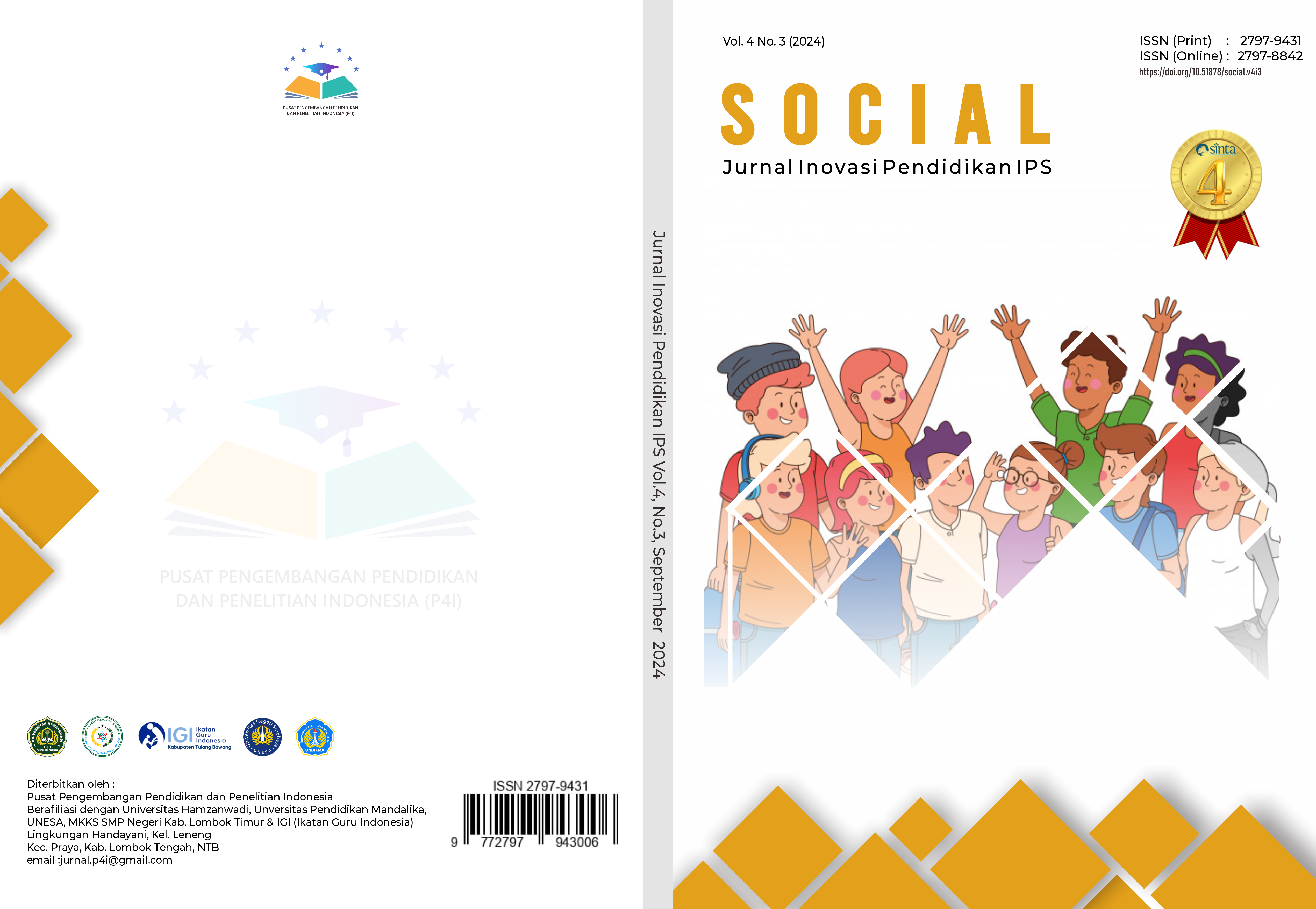PENGARUH GURU KELAS DAN ORANGTUA TERHADAP MINAT KEWIRAUSAHAAN SISWA SEKOLAH DASAR
DOI:
https://doi.org/10.51878/social.v4i3.3319Keywords:
guru kelas, orangtua, minat kewirausahaanAbstract
This study aims to explore the influence of class teachers and parents on the entrepreneurial interest of grade V students at UPT SPF SDN Kapota Yudha, Makassar, using a quantitative approach. Using 37 students as samples through saturated sampling technique and data analysis using regression as well as t-test and F-test with SPSS 26, the results showed that both the influence of class teachers and parents on students' entrepreneurial interest are statistically significant. The probability value for both variables is 0.007, with t counts of 2.872 for class teachers and 2.732 for parents, both greater than the t table of 1.688. The simultaneous test revealed a significant effect together with a sig. value of the F test of 0.000, indicating that both independent variables contribute to students' entrepreneurial interest. The unstandardized Beta coefficient shows that parental influence (0.147) is more dominant than the class teacher (0.142). In conclusion, parental influence is the main factor influencing the entrepreneurial interest of grade V students in the school.
ABSTRAK
Penelitian ini bertujuan untukmengeksplorasi pengaruh guru kelas dan orangtua terhadap minat kewirausahaan siswa kelas V di UPT SPF SDN Kapota Yudha, Makassar, dengan pendekatan kuantitatif. Menggunakan 37 siswa sebagai sampel melalui teknik sampling jenuh dan analisis data menggunakan regresi serta uji-t dan uji F dengan SPSS 26, hasil penelitian menunjukkan bahwa baik pengaruh guru kelas maupun orangtua terhadap minat kewirausahaan siswa adalah signifikan secara statistik. Nilai probabilitas untuk kedua variabel adalah 0,007, dengan t hitung masing-masing 2,872 untuk guru kelas dan 2,732 untuk orangtua, keduanya lebih besar dari t tabel 1,688. Uji simultan mengungkapkan adanya pengaruh signifikan secara bersama-sama dengan nilai sig. uji F sebesar 0,000, menunjukkan bahwa kedua variabel independen berkontribusi terhadap minat kewirausahaan siswa. Koefisien Beta tidak terstandarisasi menunjukkan bahwa pengaruh orangtua (0,147) lebih dominan dibandingkan dengan guru kelas (0,142). Kesimpulannya, pengaruh orangtua adalah faktor utama yang mempengaruhi minat kewirausahaan siswa kelas V di sekolah tersebut.
Downloads
References
Adnyana, I. G. L. A., & Purnami, N. M. (2016). Pengaruh pendidikan kewirausahaan, self efficacy dan locus of control pada niat berwirausaha. E-Jurnal Manajemen Universitas Udayana, 5(2).
Bryce, C. I., Bradley, R. H., Abry, T., Swanson, J., & Thompson, M. S. (2019). Parents’ and teachers’ academic influences, behavioral engagement, and first- and fifth-grade achievement. School Psychology Quarterly, 34(5), 492–502. https://doi.org/10.1037/SPQ0000297
Budy, D. A. (2017). Pengaruh Pendidikan Kewirausahaan dan Motivasi Kewirausahaan Terhadap Keterampilan Berwirausaha Mahasiswa Universitas 17 Agustus 1945 Jakarta. Journal For Business and Entrepreneurship, 1(1).
Bygstad, B., Iden, J., & Øvrelid, E. (2022). The emergence of a national collaborative digital ecosystem. A study of one-citizen-one-health-record in Norway BT - Norsk IKT-konferanse for forskning og utdanning. 2.
Chairani, U., Ruslan, D., & Arwansyah. (2020). The Influence of Learning Model and Learning Independence on 11th Students’ Learning Outcomes in Entrepreneurship Subject SMK N 7 Medan. 2(1), 55–66. https://doi.org/10.33258/BIOHS.V2I1.140
Darmianti. (2020). Pengaruh Lingkungan Keluarga Terhadap Minat Berwirausaha Pada Siswa SMK Negeri 1 Pangkep. Pendidikan Akuntansi Fakultas Ekonomi Universitas Negeri Makassar.
Fathoni, A. (2023). The Role of Teachers in Fostering the Entrepreneurial Attitude of Elementary School Students through Scouting. Jurnal Prima Edukasia, 11(1), 1–8. https://doi.org/10.21831/jpe.v11i1.49951
Irawan, P., Purwandari, E., Ratu, L. P., Khoirudin, A., & Iskandar, E. (2023). The role of entrepreneurship learning in growing student entrepreneurial interest. Jurnal Pendidikan Ekonomi (Jurusan Ekonomi Pembangunan, Fakultas Ekonomi Universitas Negeri Malang). https://doi.org/10.31932/jpe.v8i1.2306
Jannah, M., Arintoko, & Naufalin, L. R. (2023). Effect of the method of edupreneurship practice-based business center and school environment on interest in entrepreneurship with entrepreneurial motivation as a mediating variable. International Journal of Entrepreneurial Knowledge, 11(1), 51–71. https://doi.org/10.37335/ijek.v11i1.185
Majdi, M. Z. (2012). Pengaruh Pembelajaran Kewirausahaan, Internalisasi Nilai Kewirausahaan di Keluarga dan Motivasi Minat Berwirausaha. Educatio, 7(2), 1–15.
Mudjiyanti, R., & Sholihah, M. (2022). The Effect of Cafe Atmosphere on Loyalty through Customer Satisfaction. Innovation Business Management and Accounting Journal, 1(1), 18–23.
Owusu, M. K., Owusu, A., Fiorgbor, E. T., & Atakora, J. (2021). Career Aspiration of Students: The Influence of Peers, Teachers and Parents. 67–79. https://doi.org/10.9734/JESBS/2021/V34I230306
Ramadhani, A., & Nisa, S. (2024). Memahami Peran Komunikasi Orang Tua-Guru pada Motivasi Siswa SD. Tsaqofah, 4(3), 2203–2217. https://doi.org/10.58578/tsaqofah.v4i3.3094
Riyanti, Y., & Dewi, R. M. (2024). The Influence of Entrepreneurship Education, Entrepreneurial Motivation, And Income Expectations on Entrepreneurial Interest. Journal of Management Entrepreneurship and Tourism, 2(2), 276–283. https://doi.org/10.61277/jmet.v2i2.144
Setiawati, R., Adriani, Z., & Wediawati, B. (2022). Entrepreneurial interest in startup business based on entrepreneurial literacy and digital literacy. Jurnal Perspektif Pembiayaan Dan Pembangunan Daerah, 10(4), 235–250. https://doi.org/10.22437/ppd.v10i4.18819
Shuaibu, H., Kamin, Y., Isa, U. M., & Cledumas, A. M. (2021). The Concept of Entrepreneurship. https://doi.org/10.5772/INTECHOPEN.94857
Sitepu, E. (2023). Improving Student Learning Outcomes by Implementing Synectic Learning Strategies. JPPIPA (Jurnal Penelitian Pendidikan IPA). https://doi.org/10.29303/jppipa.v9i8.4545
Suryaningrum, I. D., & al., et. (2019). Pengaruh Pembelajaran Kewirausahaan dan Lingkungan Keluarga Terhadap Minat Berwirausaha Pada Siswa Kelas XI SMK Batik 2 Surakarta. OIKONOMIA: Jurnal Pendidikan Ekonomi, 2(2).
Sutanto, N., Titisari, K., & Pawenang, S. (2021). Work Stress, Motivation, Facilities, And Training As Factors Affecting Employee Performance At Karanganyar Primary Tax Service Office. International Journal of Economics, Business and Accounting Research (IJEBAR), 5(3), 2024–2036.
Wafa, R. N., & Muthi, I. (2024). Pengaruh Partisipasi Orang Tua dalam Proses Pembelajaran terhadap Prestasi Akademik Siswa Sekolah Dasar. Khatulistiwa, 4(3), 244–250. https://doi.org/10.55606/khatulistiwa.v4i3.3998
Wahyono, B. (2013). Pengaruh Pendidikan Kewirausahaan Terhadap Niat Berwirausaha Siswa SMK Negeri 1 Pedan Tahun 2013. Universitas Sebelas Maret Surakarta.
Downloads
Published
How to Cite
Issue
Section
License
Copyright (c) 2024 SOCIAL : Jurnal Inovasi Pendidikan IPS

This work is licensed under a Creative Commons Attribution-ShareAlike 4.0 International License.
















